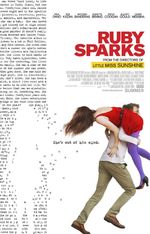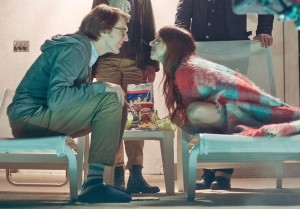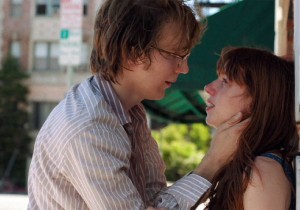 Co-directors Valerie Faris and Jonathan Dayton are so smart, so dedicated, so creative, and so purely delightful that I found it hard to believe they are so good at showing us dysfunctional characters. Their new film, “Ruby Sparks,” written by and starring Zoe Kazan, also stars Paul Dano, who played the sworn-to-silence teenager in their first hit, “Little Miss Sunshine.” In this film, Dano plays a depressed author who has been unable to write following his very successful first book. Prompted by his therapist, he creates an effervescent female character so vivid that she literally comes to life. Faris and Dayton finish each other’s sentences, not interrupting each other, just a seamless flow of love, laughter, and ideas.
Co-directors Valerie Faris and Jonathan Dayton are so smart, so dedicated, so creative, and so purely delightful that I found it hard to believe they are so good at showing us dysfunctional characters. Their new film, “Ruby Sparks,” written by and starring Zoe Kazan, also stars Paul Dano, who played the sworn-to-silence teenager in their first hit, “Little Miss Sunshine.” In this film, Dano plays a depressed author who has been unable to write following his very successful first book. Prompted by his therapist, he creates an effervescent female character so vivid that she literally comes to life. Faris and Dayton finish each other’s sentences, not interrupting each other, just a seamless flow of love, laughter, and ideas.
Dayton: We knew Paul and we met Paul was he was…what, 18?
Faris: First time we met him he was 18, an audition…
Dayton: And, we were trying to get “Little Miss Sunshine” off the ground and it took us so long to get that movie made and we were worried, oh my God, he’s going to be too old, and we knew he was such a great actor.
Faris: Such a special actor.
Dayton: We stayed friends and we met Zoe and Paul started dating her. And so when they came to us with a project with the two of them and it was the same producers as “Little Miss Sunshine.”
Faris: We almost accepted it on that alone. We didn’t have the movie sold at that point, but we love the idea of a movie that stars two great actors – especially Zoe was an unknown quantity and that’s really exciting to be able to introduce a new actor to the audience, so.
Dayton: But then with the script. We just flipped over because I like the idea of doing a romantic story but not your traditional romantic comedy, and to do a film…
Faris: It was funny and we like that. It also had a comedy elements without particularly…
Dayton: But it was really about something, you really feel like I’ve had a full meal. Here, you can walk out of a theater and feel like you’ve been on this journey.
Faris: For us anyway, that’s what it was for us. Just even making the movie means to have those elements to keep our interest for two years, I think that’s sort of the test we use, it’s interesting enough for us to spend two years, hopefully it will be interesting enough for the audience to spend an hour and a half.
The climax of the movie is a very intense scene as the writer tries to keep his creation under control. Was that difficult to film?
Dayton: Well, that was the scene that made us most excited about making this because we had never seen something like that in a movie and it was very intimidating and we didn’t know how to do it, but we knew that this was something we could sink our teeth into.
Faris: And it was also something that had to take place in the story, in this story you had to go there, you couldn’t get around it– but that didn’t mean we knew exactly what it was, it isn’t something that happens in real life, even though a lot of the other elements in the story are things that happen in real relationships, this isn’t is exactly what happens (although metaphorically it is) it was harder to sort of take the metaphor into reality, what would that be?
Dayton: As part of our regular process, we workshop films, scenes, so we workshopped that scene with other actors early on and then we acted out a lot ourselves.
Faris: Not all of that is on screen!
Dayton: Yeah, yeah, but a lot of it was – how dark does this go? We wanted it to be dark, but – I hate to even use the word dark because it is more than that; we wanted it to resonate.
Faris: Well, it’s painful, it’s going to a painful place – it’s dark, too, but I think it was more about the pain of him needing to let go of this thing that he created, and so we likened it to a binge drinker, just having to go to that point where you make yourself sick so you won’t do it again, so exploring that and trying to understand when he’s giving her these commands, does she resist him? Can she resist them? Or does she have to completely surrender? All those issues were a lot of what we did in rehearsal and it worked best to us if she had no control. And if he had complete control of her.
Dayton: And it was the one scene we couldn’t rehearse with Paul and Zoe in advance. They feared it, Zoe in particular, and so we, in the script, had very little detail, we had workshop to so that and had been thinking about it for probably…
Faris: Months…
Dayton: Months and months…
Faris: A year, but not that specific…
Dayton: So, it wasn’t until the morning before we shot
Faris: The morning of the day we shot…
Dayton: Yeah, that we sat down, we wrote out what he was going to make her do…
Faris: In our pajamas at the breakfast table…
Dayton: …and then we gave it to Zoe and Paul and they did it and it was good – it was tricky, because they’re a couple in real life, as you know, and so you don’t want Paul doing certain things that are tinged with any relevance to their relationships…so these had to come from us…
Faris: We had to give him those commands.
Dayton: It’s like when you have actors doing a sex scene; you always have to tell them exactly what you want to do, “Put your hand on their butt,” because you don’t want the actress thinking the guy is putting his hand…
Faris: That he’s doing it out of his own volition, you want it to be the character doing it…
Dayton: The thing that was amazing to us in terms of that, Zoe just threw herself into that, she didn’t want to think about it beforehand, but when she went to do it and perform it, she gave it her all – to the point of, we would give her these commands and she would have to repeat them and do them until we made a loud sound and she would switch into the next command, and so on the last take we really pushed her, because part of it was her exhaustion and he was pushing her to her limit, so we really pushed her, and I remember watching that scene and thinking, “I think we have a movie now.” It was the first time—you’re kind of adding the scenes up in your head—and watching her perform that, I just felt like she gave every bit that she had to give to it.
Faris: Which is ninety percent of that scene, is that one take where she just sort of went for it it—and we shot her side of it, first, so Paul got to see what he did, which really helped him on his side of it, but it was hard to watch her and not know what he was going to do with it, and then when we were shooting him, we really needed him to feel as much pain as she was…if he was doing it in a cold manner throughout the whole scene, it would—and you know, through editing, too, you pick all the moments where you feel his pain the most, so a lot of it was in the shoot and on the set and then in editing. It’s amazing how much you can change the scene in the and kind of calibrate how much pain you dole out and where you pull back and then the music is another element that really…
Tell us a bit about the music in the film.
Dayton: The soundtrack is really such an important part of the movie, and we worked really hard. It was the same composers we had on Little Miss Sunshine, but it’s an entirely different kind of score…
Faris: You know, it’s funny because small movies have ‘smaller sounding scores, indie-kind of sounding scores, and we decided we really wanted to go for a big sounding score.
Dayton: So we had like a 60 piece orchestra, and it was so much fun.
(more…)



